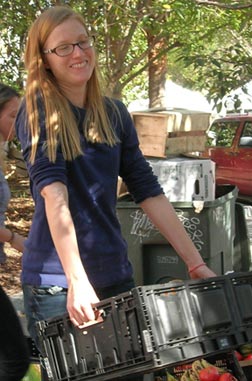
 Marie Schaner takes her job as a campus recruiter for the Catholic Volunteer Network seriously because she’s seen the benefits firsthand.
Marie Schaner takes her job as a campus recruiter for the Catholic Volunteer Network seriously because she’s seen the benefits firsthand.
The non-profit organization pairs people with over 200 domestic and international volunteer programs. Schaner said all of them are faithbased and volunteers live in community.
A junior at the College of Charleston, Schaner became involved with the network through the Diocese of Charleston’s Campus Ministry office, which now links with Catholic Extension services and Catholic Volunteer Network through a grant.
Schaner said she wants people to understand how much they’ll get back when they volunteer for an immersion program.
Others who have been involved echo her sentiment.
Stacey Sangtian said she knew she wanted to serve in some way, but didn’t know where to begin. She went to www.catholicvolunteernetwork.org and used their Response guide to help her choose Dominican Volunteers USA, where she spent a year after graduating from the College of Charleston.
Sangtian noted that it was a big step to leave her comfort zone — with her familiar college apartment and lab-study classes — to teach preschoolers in an impoverished area of New Orleans.
“What a blessing it is to experience the personal growth and changes that come with branching out and doing this year of service,” she said. “What I’m learning through my experiences in New Orleans won’t help improve my lab techniques, but I know they’ll help improve the lives of the children I teach and will shape who I am for the better.”
Jim Grove, director of Campus Ministry, said it’s a challenge to get young adults involved in volunteer immersion programs.
It’s a very different lifestyle from what these young adults are used to, and from that perspective, it can seem intimidating, he said.
“It’s worth the risk,” Grove added, “you have so many values percolating in you as you do real service.”
Schaner recently spent time in Honduras volunteering with LAMB ministry, which operates an elementary school with over 250 children, a residential home for over 60 abused and neglected children, a community assistance program and more.
Her time there not only affirmed her calling to work in special education, it also expanded her thinking to understand how global connections work.
She said one little boy particularly touched her heart. Confined to a wheelchair, he suffered a disability that could be fixed in a more developed country. But in a poverty-stricken place like Honduras, the disabled are typically abandoned and left to fend for themselves.
When Schaner returned to the U.S., she became involved with a campus program that teaches intellectually disabled students the skills needed to live and work on their own. She said it’s the sort of systemic change that’s required to actually turn things around.
Grove agreed, noting that addressing problems at the root is what volunteer immersion programs teach to young adults.
“We’re trying to get young adults with a natural inclination to reach out their hand to others to become involved,” he said.
